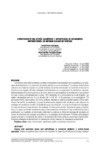Mostrar o rexistro simple do ítem
Afrontamiento del estrés académico y autoeficacia en estudiantes universitarios: un enfoque basado en perfiles
| dc.contributor.author | Freire Rodríguez, Carlos | |
| dc.contributor.author | Ferradás Canedo, María del Mar | |
| dc.date.accessioned | 2024-06-21T09:36:40Z | |
| dc.date.available | 2024-06-21T09:36:40Z | |
| dc.date.issued | 2020 | |
| dc.identifier.citation | Rodríguez, C. F., & Canedo, M. D. M. F. (2020). Afrontamiento del estrés académico y autoeficacia en estudiantes universitarios: un enfoque basado en perfiles. Revista INFAD de Psicología. International Journal of Developmental and Educational Psychology., 1(1), 133-142. https://doi.org/10.17060/ijodaep.2020.n1.v1.1769. | es_ES |
| dc.identifier.uri | http://hdl.handle.net/2183/37268 | |
| dc.description.abstract | [Resumen] Losestudiossobreestrésacadémico constatan el importanterol desempeñado por la autoeficacia y las estrategias de afrontamiento en la prevención de estados patológicos en los estudiantes. Sin embargo, hasta la fecha carecemos de evidencias respecto a la posible existencia de perfiles diferenciados de estudiantes en función de la forma en que conjugan diferentes estrategias de afrontamiento con sus expectativas de autoeficacia. Este planteamiento basado en la persona permitiría, por tanto, determinar qué estudiantes se encontrarían en una situación de mayor y menor vulnerabilidad ante el estrés. 1072 estudiantes de la Universidade da Coruña (España), con edades comprendidas entre los 18 y los 48 años (M = 21.09; DT = 3.16) participaron en la investigación. 729 participantes (68%) eran mujeres y 343 (32%), hombres. Mediante un análisis de perfiles latentes (LPA) se identificaron tres perfiles de estudiantes: un grupo de afrontamiento adaptativo (alta autoeficacia y alta utilización de estrategias de reevaluación positiva, búsqueda de apoyo y planificación), un grupo de afrontamiento desadaptativo (baja autoeficacia y baja utilización de estrategias de reevaluación positiva, búsqueda de apoyo y planificación) y un grupo con elevada búsqueda de apoyo y baja autoeficacia combinada con baja reevaluación positiva y planificación. Los resultados de este estudio evidencian la existencia de diferentes tipologías de estudiantes en función de la forma en que conjugan su autoeficacia y sus estrategias de afrontamiento. Por tanto, estos hallazgos parecen refrendar la conveniencia de analizar el afrontamiento del estrés académico universitario desde la flexibilidad de estrategias de afrontamiento en combinación con las creencias de competencia autopercibida. | es_ES |
| dc.description.abstract | [Abstract] Coping with academic stress and self-efficacy in university students: a profile-based approach. Studies on academic stress confirm the important role played by self-efficacy and coping strategies in the prevention of pathological conditions in students. However, to date we lack evidence regarding the possible existence of differentiated profiles of students depending on the way they combine different coping strategies with their self-efficacy expectations. This person-based approach would therefore allow to determine which students would be in a situation of greater and lesser vulnerability to stress. 1072 students from the University of Corunna (Spain), aged between 18 and 48 years (M = 21.09; SD = 3.16) participated in the research. 729 participants (68%) were women and 343 (32%), men. Through alatent profileanalysis(LPA), threestudent profiles wereiden tified: an adaptive coping group (high self-efficacy and high use of positive reappraisal, support seeking, and planning), a maladaptive coping group (low self-efficacy and low use of positive reappraisal, seeking support, and planning), and a group with high seeking support combined with low self-efficacy, low positive reappraisal and low planning. The results of this study show the existence of different types of students depending on the way they combine their self-efficacy and their coping strategies. Therefore, these findings seem to endorse the desirability of analyzing coping with university academic stress from the flexibility of coping strategies in combination with the beliefs of self-perceived competence. | es_ES |
| dc.language.iso | spa | es_ES |
| dc.relation.uri | https://revista.infad.eu/index.php/IJODAEP/article/view/1769 | es_ES |
| dc.rights | Atribución-NoComercial-SinDerivadas 3.0 España | es_ES |
| dc.rights.uri | http://creativecommons.org/licenses/by-nc-nd/3.0/es/ | * |
| dc.subject | Estrés | es_ES |
| dc.subject | Afrontamiento | es_ES |
| dc.subject | Autoeficacia | es_ES |
| dc.subject | Perfiles | es_ES |
| dc.subject | Estudiantes universitarios | es_ES |
| dc.subject | Stress | es_ES |
| dc.subject | Coping | es_ES |
| dc.subject | Self-efficacy | es_ES |
| dc.subject | Profiles | es_ES |
| dc.subject | University students | es_ES |
| dc.title | Afrontamiento del estrés académico y autoeficacia en estudiantes universitarios: un enfoque basado en perfiles | es_ES |
| dc.type | info:eu-repo/semantics/article | es_ES |
| dc.rights.access | info:eu-repo/semantics/openAccess | es_ES |
| UDC.journalTitle | Revista INFAD de Psicología. International Journal of Developmental and Educational Psychology | es_ES |
| UDC.volume | 1 | es_ES |
| UDC.issue | 1 | es_ES |
| UDC.startPage | 133 | es_ES |
| UDC.endPage | 142 | es_ES |
| dc.identifier.doi | https://doi.org/10.17060/ijodaep.2020.n1.v1.1769 |
Ficheiros no ítem
Este ítem aparece na(s) seguinte(s) colección(s)
-
GI-GIPED - Artigos [58]






